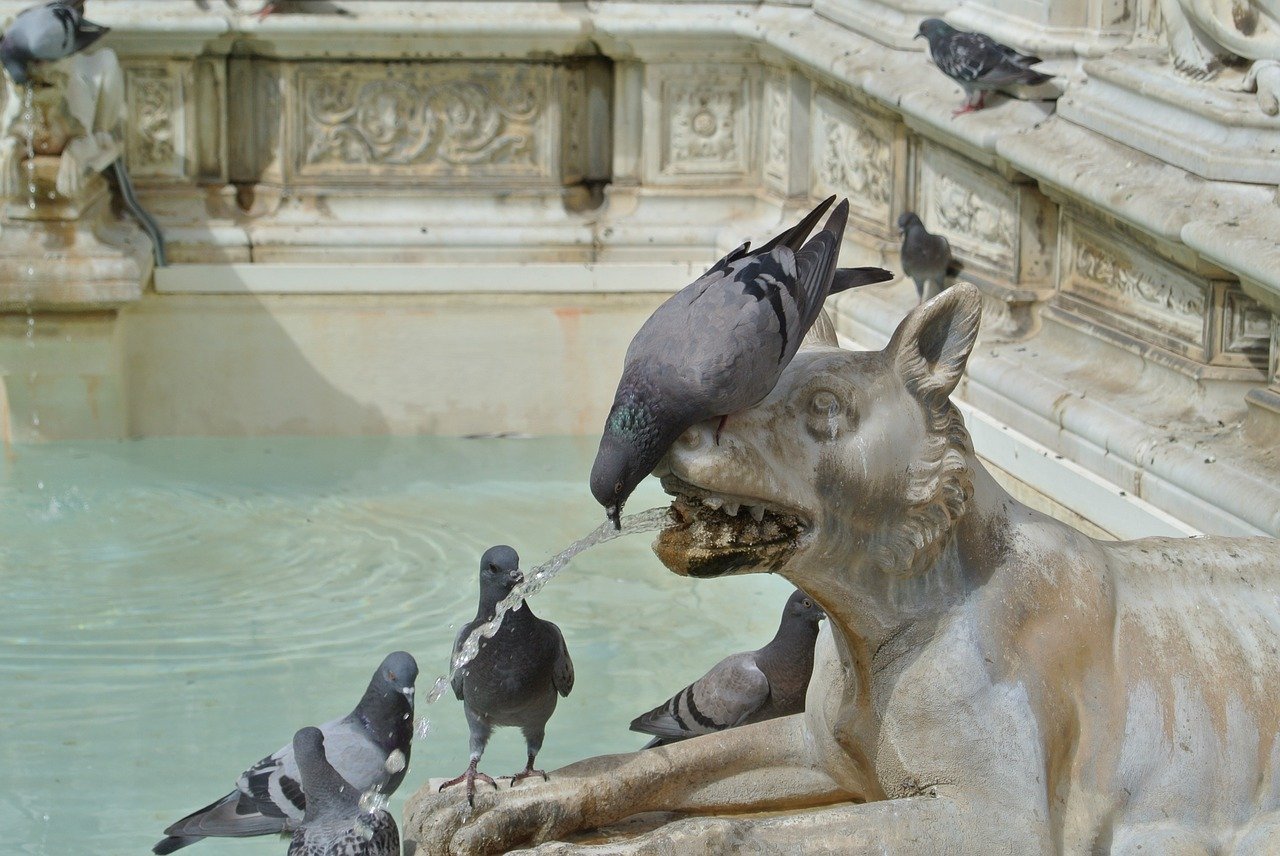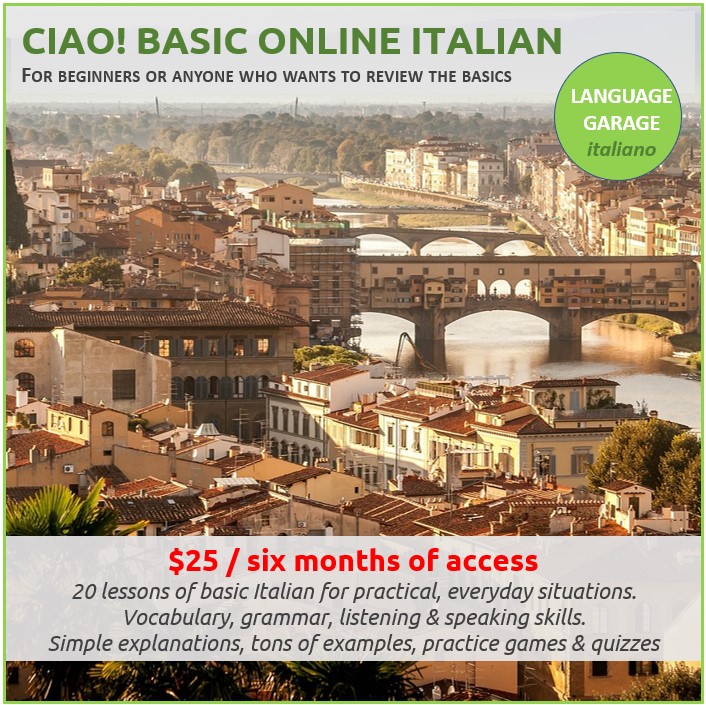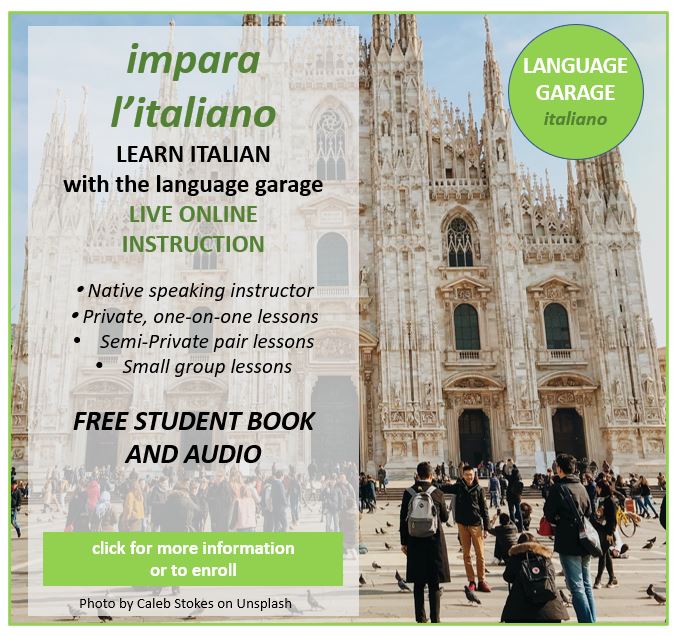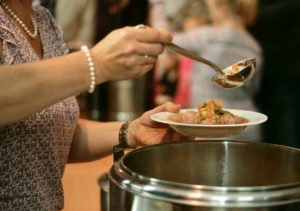Hai degli animali domestici? Do you have any pets?
People keep all sorts of animals as pets, but the most common ones are un cane a dog, un gatto a cat, un pesce rosso a goldfish, un parrocchetto / un pappagallino a parakeet, un pappagallo a parrot, un criceto a hamster. Two animals that aren’t usually pets but that you can often find in or around buildings are: un topo a mouse, un ratto a rat.
- Abbiamo un cane e un gatto.
We have a dog and a cat. - Come si chiama il tuo cane/gatto?
What’s your dog’s/cat’s name? - Sto giocando con il cucciolo.
I’m playing with our puppy.
- Sto accarezzando il gattino.
I’m petting our kitten. - Il tuo cane morde?
Does your dog bite? - Il tuo gatto graffia?
Does your cat scratch? - Ho un pesce rosso in una vaschetta.
I have a goldfish in a fishbowl. - Ho un sacco di pesci in un acquario.
I have a lot of fish in an aquarium. - Abbiamo due criceti in una gabbia.
We have two hamsters in a cage. - Il mio pappagallo parla tanto.
My parrot talks a lot. - Ho urlato quando ho visto il topo.
I screamed when I saw a mouse. - Non è un topo, è un ratto!
That’s not a mouse, it’s a rat!
Che verso fa il cane? What sound does a dog make?
In English, dogs say “woof” and cats say “meow,” but of course that’s all different in Italian.
- I cani abbaiano. Il cane fa “Bau, Bau!”
Dogs bark. A dog says “Woof!” - I gatti miagolano. Il gatto fa “Miao!”
Cats meow. A cat says “Meow!” - Gli uccelli cinguettano. L’uccello fa “Cip cip!”
Birds chirp. A bird says “Tweet!” - Le mucche muggiscono. La mucca fa “Muuu.”
Cows moo. A cow says “moo.” - I galli cantano. Il gallo fa “Chicchirichi.”
Roosters crow. A rooster says “cock-a-doodle-do.” - Le anatre starnazzano. L’anatra fa “Qua qua.”
Ducks quack. A duck says “quack.” - I maiali grugniscono. Il maiale fa “Oink oink.”
Pigs squeal. A pig says “oink oink.” - I cani ringhiano quando sono arrabbiati.
Dogs growl when they’re angry. - I gatti fanno le fusa quando sono felici.
Cats purr when they’re happy.
Nella fattoria: On the Farm
The most usual animals on a farm are: un cavallo a horse, una mucca a cow, un toro a bull, un maiale a pig, una pecora a sheep, una gallina a chicken, un’oca a goose, una capra a goat, un asino a donkey.
- Il cavallo corre sul prato.
The horse is running in the pasture. - Le mucche sono nella stalla.
The cows are in the barn. - I maiali si rotolano nel fango.
The pigs are lying in the mud. - Le galline sono nel pollaio.
The chickens are in the coop. - Il contadino munge le mucche.
The farmer milks the cows. - Le galline depongono le uova.
Chickens lay eggs. - La lana viene dalle pecore.
Wool comes from sheep.
Some other words related to animals that you want to know are: la pelliccia / il pelo fur, le squame scales, una coda a tail, uno zoccolo a hoof, un corno a horn, le piume feathers, una criniera a mane, un artiglio a claw.
- Il cavallo ha una bellissima criniera.
The horse has a beautiful mane. - L’oca ha le piume bianche.
The goose has white feathers. - I tori hanno le corna.
Bulls have horns. - Il maiale ha la coda corta.
The pig has a little tail. - Quali animali hanno gli zoccoli?
Which animals have hooves? - Attento/a! Il gatto ha gli artigli affilati.
Be careful! The cat has sharp claws.
Uccelli: Birds
Here’s some vocabulary for our feathered friends: un uccello a bird, un’anatra a duck, un’aquila an eagle, un falco a hawk, un piccione a pigeon, un tacchino a turkey, un pavone a peacock, un cigno a swan, un gufo an owl, un gabbiano a seagull.
- Senti gli uccelli?
Do you hear the birds? - Ci sono delle anatre vicino al lago.
There are some ducks next to the lake. - Le aquile volano molto in alto.
Eagles fly very high. - I pavoni hanno delle piume bellissime.
Peacocks have beautiful feathers. - Ci sono un sacco di piccioni nel parco.
There are a lot of pigeons in the park. - I cigni sono animali molto eleganti.
Swans are very elegant animals. - Il gufo bubola nel bosco.
An owl is hooting in the woods. - I gabbiani sorvolano la spiaggia.
The seagulls are flying over the beach.
Animali selvatici: Wild Animals
The most common wild animals around the world are these: un cervo a deer, un orso a bear, un lupo a wolf, una volpe a fox, un coyote a coyote, un procione a raccoon, uno scoiattolo a squirrel, un coniglio a rabbit, un pipistrello a bat, un serpente a snake, una lucertola a lizard.
- I cervi mangiano l’erba nel campo.
The deer are eating grass in the field. - Una volpe è corsa nel bosco.
A fox ran into the woods. - Abbiamo visto un orso mentre facevamo trekking.
We saw a bear when we were hiking. - I lupi ululano di notte.
Wolves howl at night. - Gli scoiattoli salgono sugli alberi molto velocemente.
Squirrels climb trees very quickly. - Ci sono procioni qui?
Are there raccoons here? - I pipistrelli escono dopo il tramonto.
Bats come out after sunset. - Attento/a! C’è un serpente sul sentiero.
Be careful! There’s a snake on the path.
Allo zoo: At the Zoo
Depending on where you live, you may not need to go to a zoo to see these animals. But for most of us, a zoo is the only place where we’ll see these: un elefante an elephant, un leone a lion, una tigre a tiger, una giraffa a giraffe, una zebra a zebra, un rinoceronte a rhinoceros, una scimmia a monkey, un gorilla a gorilla, un ippopotamo a hippopotamus.
- Gli elefanti hanno la proboscide e zanne lunghe.
Elephants have trunks and long tusks. - I leoni ruggiscono.
Lions roar and snarl. - Le tigri hanno le strisce.
Tigers have stripes. - Le giraffe hanno il collo molto lungo.
Giraffes have very long necks. - Le zebre hanno strisce bianche e nere.
Zebras have black and white stripes. - I rinoceronti hanno corni molto grandi.
Rhinos have very big horns. - Le scimmie trascorrono molto tempo sugli alberi.
Monkeys spend a lot of time in trees. - I gorilla sono molto simili agli esseri umani.
Gorillas are very similar to people. - Gli ippopotami corrono molto veloci!
Hippos run very fast!
Nell’acqua: In the Water
If you live near a lake or river, you may see some of these: un pesce a fish, una rana a frog, una tartaruga a turtle, un castoro a beaver, una lumaca a snail, un alligatore an alligator, un coccodrillo a crocodile.
- Che tipo di pesci vivono in questo lago?
What kind of fish live in this lake? - Su quella roccia c’è una tartaruga.
There’s a turtle on that rock. - Nelle notti d’estate, sentiamo gracidare le rane.
We hear frogs at night in the summer. - Le lumache si muovono molto, molto lentamente.
Snails move very, very slowly. - I castori rosicchiano gli alberi e costruiscono dighe.
Beavers chew trees and make dams. - È un alligatore o un coccodrillo?
Is that an alligator or a crocodile?
In the ocean, you may see: uno squalo a shark, una balena a whale, un delfino a dolphin, un granchio a crab, un’aragosta / un astice a lobster, una medusa a jellyfish, una stella marina a starfish, un riccio di mare a sea urchin, un’anguilla an eel, una vongola a clam, una cozza a mussel, un gamberetto a shrimp, un polipo an octopus, un calamaro a squid.
- Ho paura degli squali, quindi non faccio il bagno a mare!
I’m afraid of sharks, so I don’t swim in the sea! - Abbiamo visto dei delfini nuotare vicino alla riva.
We saw dolphins swimming near the beach. - Oggi non facciamo il bagno. Ci sono troppe meduse.
We’re not swimming today. There are too many jellyfish. - Abbiamo trovato una stella marina sulla spiaggia.
We found a starfish on the beach. - Ahi! Ho calpestato un riccio di mare. Che dolore!
Ouch! I stepped on a sea urchin. That’s painful! - Ci sono un sacco di granchi vicino a quelle rocce.
There are a lot of crabs near those rocks. - Le vongole vivono nella sabbia.
Clams live in the sand. - Le cozze vivono sulle rocce.
Mussels live on rocks.
Insetti e altre piccole creature: Insects and Other Small Creatures
If you every need to talk about insects, bugs, or other creep-crawlies, you will need to know these: un insetto a bug, un ragno a spider, un’ape a bee, una formica an ant, uno scarabeo a beetle, una coccinella a ladybug, una mosca a fly, una zanzara a mosquito, una farfalla a butterfly, una falena a moth, un verme a worm, uno scorpione a scorpion.
- Non mi piacciono gli insetti!
I don’t like bugs! - C’è un ragno enorme sul muro della mia stanza da letto!
There’s a big spider crawling on the wall in my bedroom! - Stasera mi stanno mordendo le zanzare.
The mosquitos are biting me tonight. - Mi ha punto un’ape!
I was stung by a bee! - Le farfalle sono belle e colorate.
Butterflies are beautiful and colorful. - Di notte, le falene volano intorno alle luci.
Moths fly around lights at night. - I vermi vivono nel terreno.
Worms live in the soil. - Le coccinelle sono rosse e nere.
Ladybugs are red and black. - Attento/a! Ci sono scorpioni qui.
Be careful! There are scorpions here.
Do you want to learn Italian?
Check out our other posts on Italian language, culture, and more. And if you’re looking for convenient and affordable live Italian lessons with a real teacher, check out The Language Garage. Our lessons are given online in a virtual classroom, so it doesn’t matter where you live or work – we can come to you. And we have flexible options, with a free trial so that you can decide if there’s a fit. Check us out!






